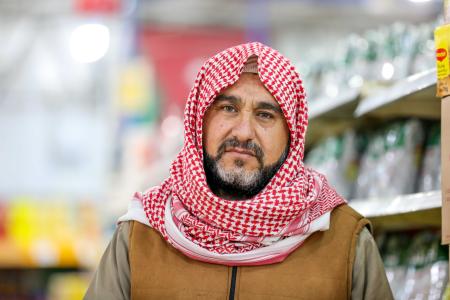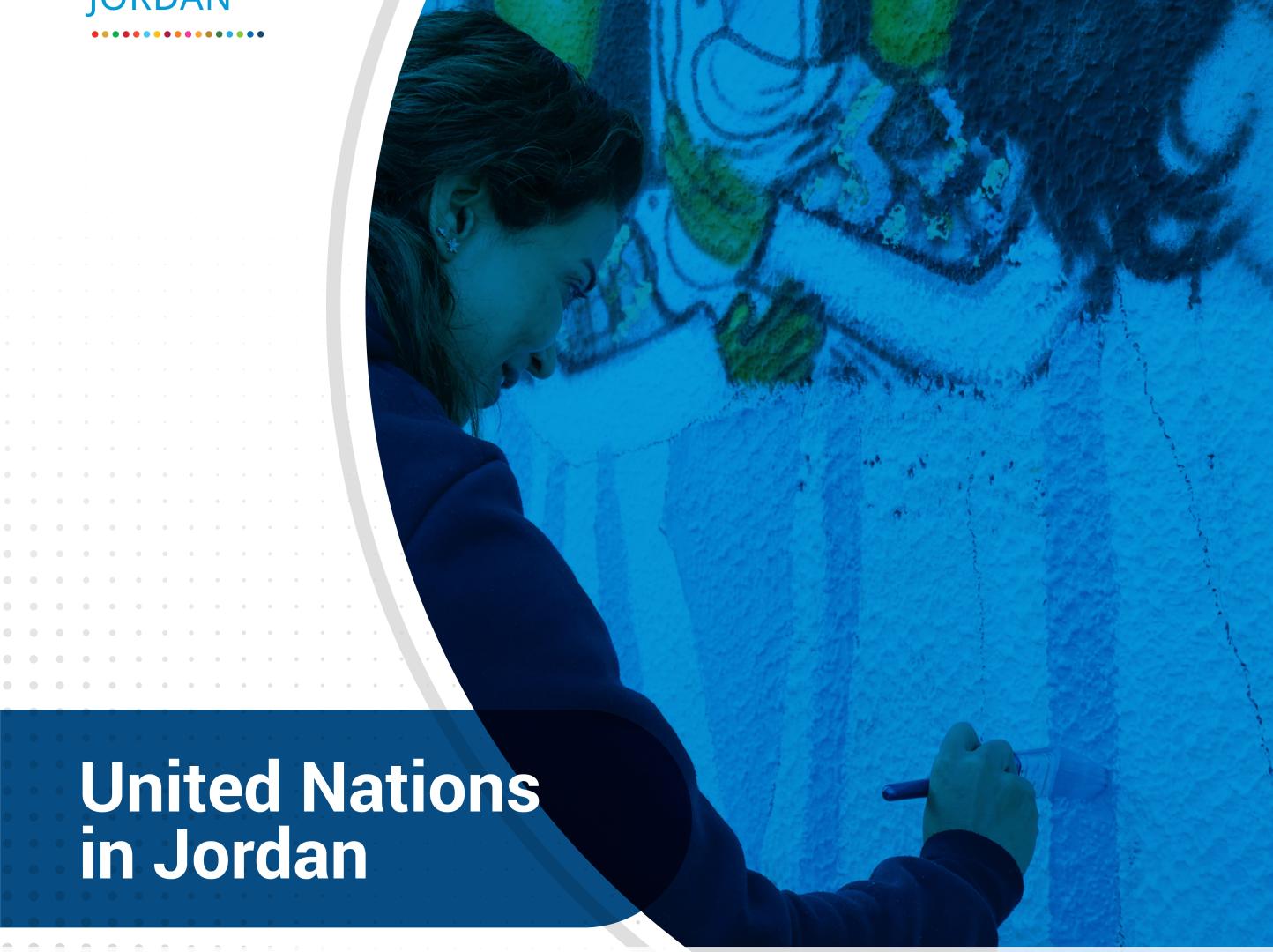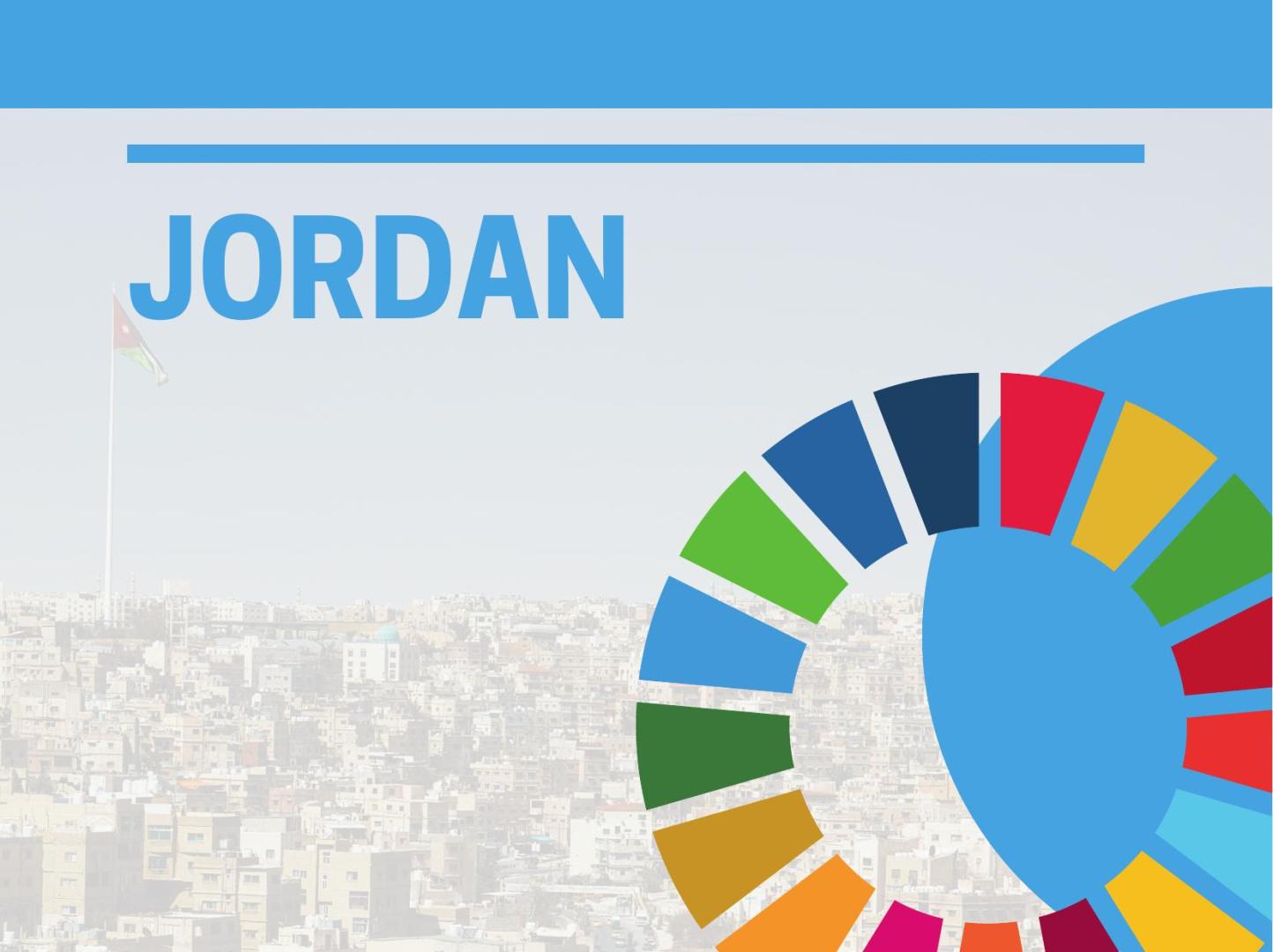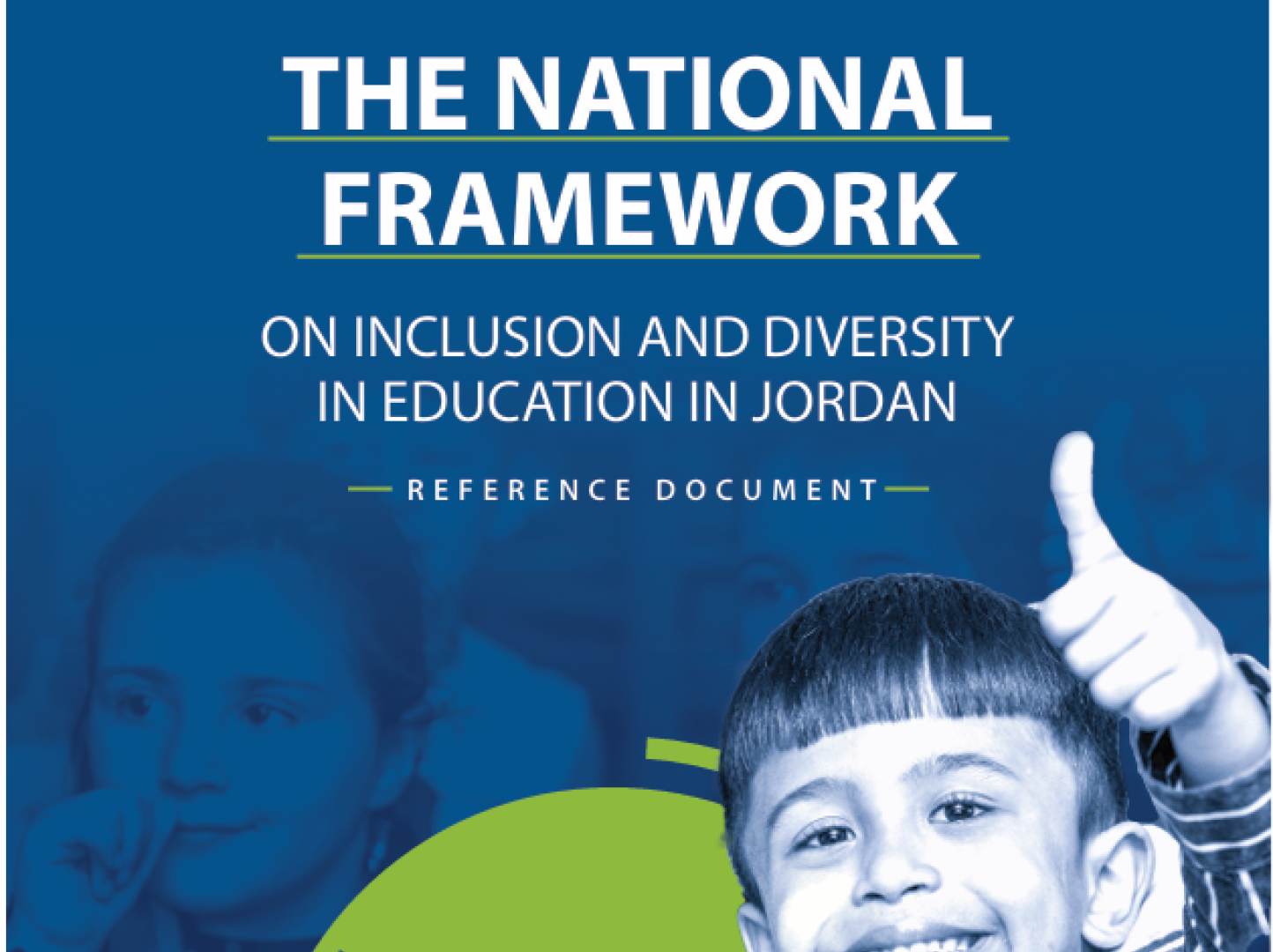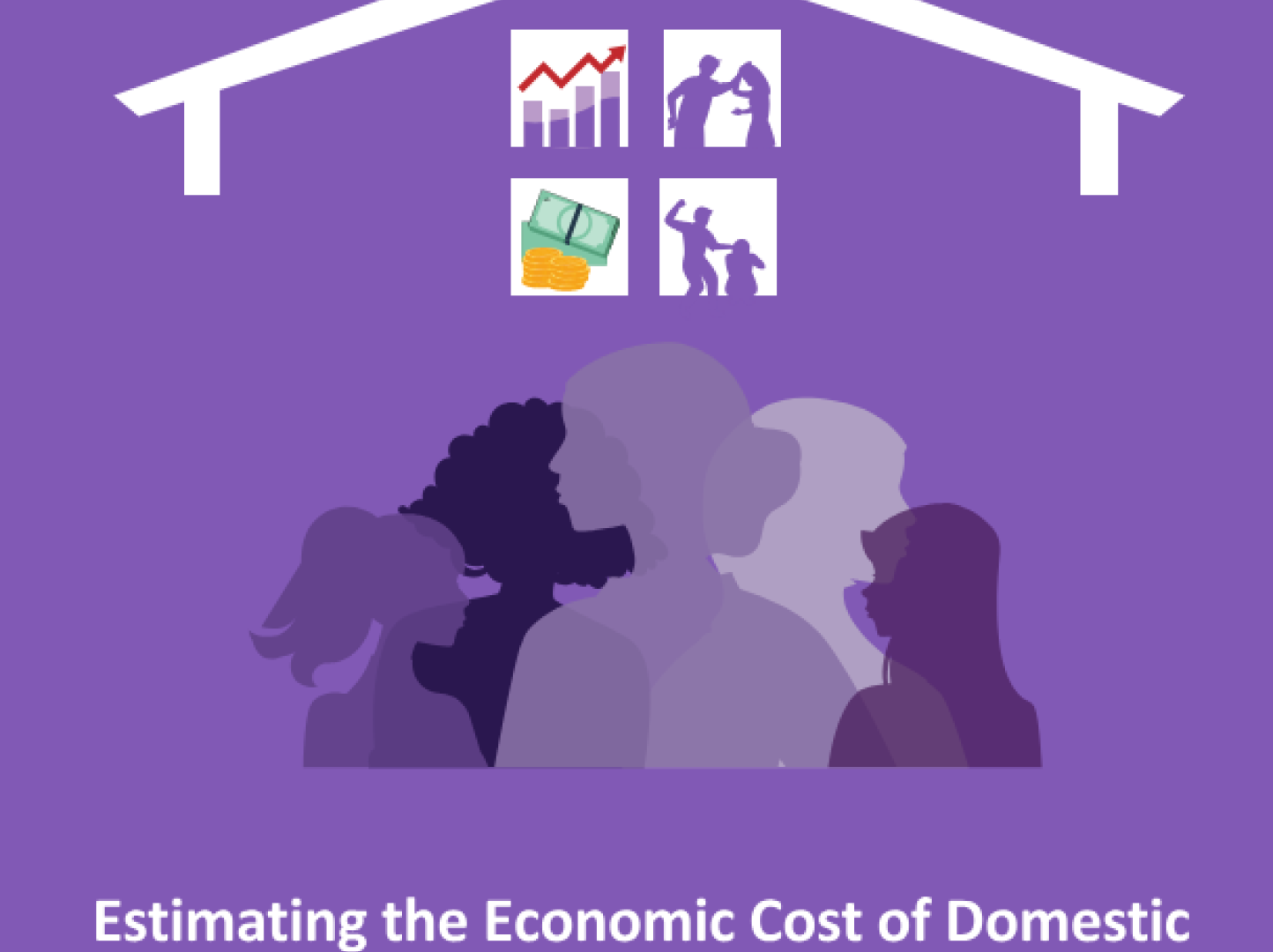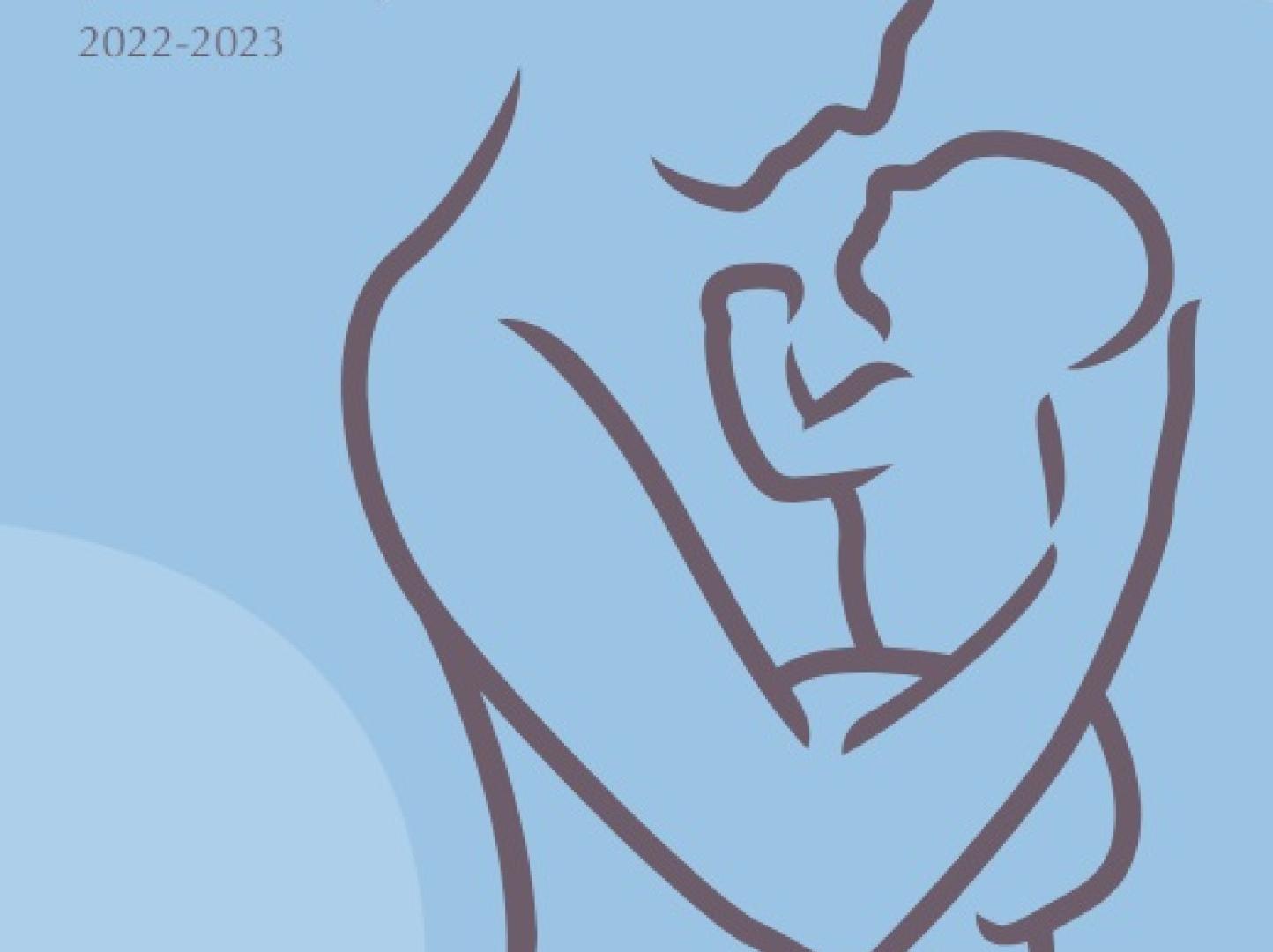Latest
Press Release
03 July 2025
“Through Their Lens” Exhibition opens: Syrian refugees share their stories in photos
Learn more
Story
30 June 2025
Community-led Climate Actions to Boost Resilience in Jordan
Learn more
Story
18 June 2025
Holding On — Stories of Survival and Dignity in Zaatari Camp
Learn more
Latest
The Sustainable Development Goals in Jordan
The Sustainable Development Goals are a global call to action to end poverty, protect the earth’s environment and climate, and ensure that people everywhere can enjoy peace and prosperity. These are the goals the UN is working on in Jordan:
Story
30 June 2025
Community-led Climate Actions to Boost Resilience in Jordan
Across Jordan, a quiet yet powerful transformation is underway. Communities, young leaders and women are using the power of climate action to lead the way for a greener, more equitable and resilient Jordan. From schoolyards to rooftops, communities across the country are restoring ecosystems, creating jobs and cultivating hope for the future.The UN in Jordan team is working closely with the Government and international partners to support these locally led efforts, demonstrating what inclusive climate action looks like in practice: community-focused, driven by innovation, and sustained by cooperation and collaboration.As Jordan faces an increasing number of environmental challenges, including rising temperatures, water scarcity, land degradation and biodiversity loss, these initiatives chart a path toward a greener transformation and show that climate resilience is not a distant goal but a collective journey, powered by shared purpose. Under the leadership of the UN Resident Coordinator and in line with its 2023-2027 strategic priorities, the UN in Jordan team mobilises technical expertise to support national initiatives to tackle these issues, promoting climate adaptation and building resilience at several levels. Beekeeping for climate resilience and livelihoodIn the forested hills of Jerash and Ajloun Governorates, wildfires and droughts increasingly undermine biodiversity and agriculture. One local resident, Afaf Nizami, leverages beekeeping to reverse the trend while providing opportunities for members of her community, particularly women, to boost their livelihoods. As the Chairwoman of the Al-Nashmiyya Charitable Society for Women and Child Development, Afaf has long worked to support vulnerable women and children in her community. But with the increasing frequency of wildfires, unpredictable rainfall, and extended dry spells, Afaf saw the need for a new kind of empowerment, one rooted in resilience, sustainability and nature-based solutions.Her community-based organization was selected as one of six beneficiaries of a joint initiative led by the Food and Agriculture Organization (FAO) and the Government of Japan. The initiative integrates disaster risk reduction with sustainable livelihood development in Jerash and Ajloun.Through this programme, Afaf and her colleagues received training on fire prevention, flood response, drought mitigation and beekeeping. In addition to the knowledge that Afaf acquired, she also received 90 inhabited beehives, six modern honey extractor machines, stainless steel tanks, harvesting gear and marketing tools. This equipment was everything she needed to turn the training she received into an income stream to boost her livelihood.“This isn’t just about producing honey. This is about securing a future for women-led associations, generating income and building food security in our communities. With the right tools, we are now able to launch real, sustainable products,” said Afaf.For her, beekeeping has become a symbol of what is possible when the right strategic and infrastructure support complements technical training and local know-how. Her association is now developing a community apiary, where women can learn, work and earn an income together, reclaiming economic agency while contributing to environmental restoration.The impact goes beyond Afaf’s association. Expanding on this initiative and in partnership with national authorities, two governorate-level Disaster Risk Reduction (DRR) committees were established in Jerash and Ajloun. These committees are helping integrate grassroots resilience into broader regional planning. Further, these activities revitalised efforts to strengthen ecosystem rehabilitation and sustainable land use while placing communities at the centre of climate adaptation efforts.Bringing climate action to the classroomIn the industrial city of Zarqa, two 23-year-olds—Mahdi and Ruba—are taking climate action in their community where it matters most: in classrooms with the next generation.As Youth Climate Leaders under the UN Children’s Fund (UNICEF)’s Sawn programme, the duo co-created Climate Friends, a grassroots environmental initiative aimed at educating schoolchildren about climate change through interactive games, storytelling and creative learning tools. “We targeted this age group because children are the future,” explains Ruba. “Whatever they learn at an early age stays with them, and we wanted those lessons to be about care for the Earth.”This engagement brought sustainability into classrooms in a playful and engaging way. Children learned about recycling by building toys from plastic cups. They explored concepts of biodiversity through planting seeds and water conservation by simulating rainfall in miniature ecosystems. Mahdi and Ruba aimed to send a simple yet powerful message that resonates with young students: “If we take care of the environment, the environment will take care of us.”For Mahdi, the work was deeply personal. “In Zarqa, the air quality is only getting worse. You see trash everywhere. But being part of this initiative gave me something more than frustration—it gave me hope,” he says. “Hope that youth, when united, can raise awareness, take action, and actually change things.” The Sawn programme, a partnership between the Jordanian Ministry of Youth, the Ministry of Environment and UNICEF, and which was implemented by the non-profit Generations for Peace, has engaged with youth climate leaders like Mahdi and Ruba. This initiative aims to cultivate their leadership with the right training and provide them with opportunities to participate in national and global fora on climate change. With generous support from the Kingdom of the Netherlands through the PROSPECTS partnership, these young leaders are rolling out climate advocacy initiatives across Jordan’s 12 governorates, creating a ripple effect of awareness, responsibility and change.“The children understood more than we expected,” Ruba reflects. “ They reminded us that a cleaner Jordan is possible if we start early, and we start together.”Smart innovation for water securityIn Irbid and Mafraq, where water is both life and limitation, young Jordanian innovators forge new paths toward climate resilience, bringing prototypes. Under the “Scaling Up Water Innovation for Climate Security” initiative, supported by the UN Development Programme (UNDP) and funded by the Swedish International Development Agency (Sida) through the SDG-Climate Facility, a group of visionary young entrepreneurs is proving that water scarcity can be met with ingenuity, not despair.Seven youth-led Small and Medium Enterprises (SMEs) are at the heart of this transformation. They are deploying a mix of AI-powered irrigation systems, Internet of Things (IoT) devices, hydroponic solutions, vertical gardens and green wall technologies—each tailored to Jordan’s harsh climate and fragile ecosystems. One youth founder proudly shared, “Our startup reduced water use by 20 per cent while increasing crop yield. This isn’t just about agriculture. It’s about innovation, survival and responsibility.”But the project’s reach extends far beyond these seven companies. More than 25 startups in the sustainability space were trained in financial modelling, value proposition design, and customer development. Most beneficiaries, 63 per cent, were young people under 30, making this initiative a powerful model of youth-centred, impact-driven entrepreneurship. From Irbid’s university halls to Mafraq’s farmlands, these innovations are already bearing fruit.For example, two start-ups, Smart Green and SmartWay to Innovation, are revolutionising household farming by using data to optimise water use. Other startups, Senara, Green On, and iPlant, introduced urban farming models that are redefining food production in water-scarce neighborhoods. Al-Yaqout for Agricultural Investments and KeyLife Electronics developed soil enhancement and water retention products, helping farmers grow more with less resources. Guided by the Youth 2030 strategy, the initiative also ensured long-term sustainability by training beneficiaries in system maintenance and transferring technical knowledge and ownership to the communities.Jordan’s community-led leadership is demonstrating the critical role of local action in building climate resilience. With the support of the UN in Jordan, these innovative approaches make the case that putting the community, including women and young people, in the driver’s seat of sustainable development paves the way for a prosperous, sustainable future.
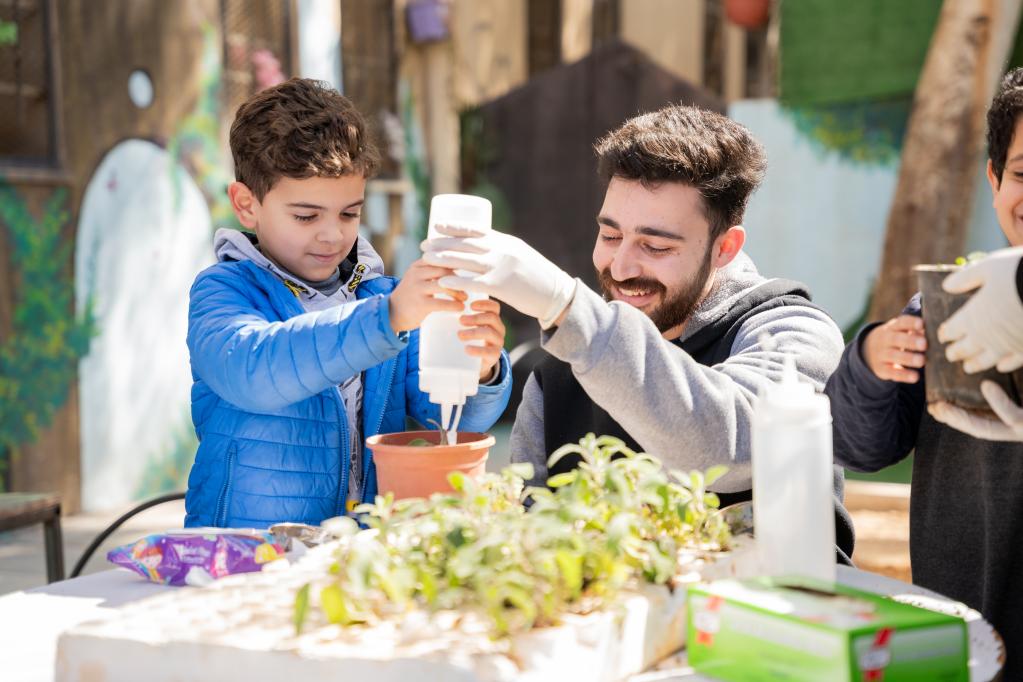
Story
18 June 2025
Holding On — Stories of Survival and Dignity in Zaatari Camp
The familiar bustle of the camp’s streets, once lively with the chatter of children and the aroma of shared meals, had given way to a quieter rhythm. For many here, the idea of returning home no longer belonged to the realm of dreams. It was being weighed, not with hope alone, but with careful reflection. Abu Hamzeh Holds on to Dignity and Hope Amid Rising HardshipThe supermarket, one of the two contracted by WFP, was quieter than usual. As shoppers moved between shelves, eyes careful and carts modest, a man in his late forties caught the eye. He moved with quiet confidence, selecting items with purpose: rice, lentils, cooking oil, a few other basics. That man was Abu Hamzeh. A father of six, five daughters and a young son, two of whom were born here in the camp. His smile stayed as he welcomed the idea of a chat, inviting us over with the warmth only found in places where hospitality is offered not from abundance, but from generosity of spirit.“We’ve lived here for nearly thirteen years,” he said. “It’s not easy, but it’s home because we’ve made it one. And because we have no other.”Like many others in the camp, Abu Hamzeh’s family depends on WFP monthly assistance to meet their food needs. But over the past two years, reduced cash assistance has meant reduced food portions.“The assistance we get is the reason my children don’t go to sleep hungry,” he said. “Even if it’s less than before, it’s what keeps us going. Without it, I don’t know how we would manage. It gives us a little peace… and dignity.” “We used to get more,” he said, pausing as he glanced at his modest cart. “Now, it barely lasts the month. Still, without it, I don’t know what we’d do.”There’s a deep, quiet pride in Abu Hamzeh, a kind of strength that refuses to wear itself on the outside. But even that strength flinches when talk turns to Syria.“My house in Daraa is in rubble now,” he said, voice steady but eyes clouded. “Even if I wanted to return, there’s no roof for my children. No work. Just debts from trying to live here.”His words held no bitterness. Only the resignation of someone who has done the math and found that the numbers don’t add up. Not yet. Then, as he steadied his cart to leave, he added, almost to himself: “Things are still uncertain for my family. At least here, with the little we have, we can still carry on.”Alia and Naseem Find Strength in Family and the Will to RebuildJust a few caravans down the road, a different kind of scene unfolded. Quieter still, yet just as telling. Alia stood outside her shelter, hands deep in a basin of green fava beans. The pods were dark, a little too soft, with edges that had started to blacken — likely bought at a discount from the informal market at Zaatari camp. She sorted through them methodically, saving what she could. Her husband, Naseem, stood near her, his gaze steady, resting on the empty mattresses where their children usually sat after school.The triplets are thirteen now, born just two months before the family fled Syria. Today, they were at school — something Alia and Naseem take great pride in. Education is their anchor.“We’ve sacrificed a lot to keep them going to class,” Alia said, brushing her hands on her dress. “If there’s one thing we can give them, it’s a chance to learn. Something we hope no war can take away.”Back in Syria, Alia worked at the national electricity company. Here in the camp, she found short-term work under a rotating program with an NGO, but that ended two months ago when the project was cut due to funding shortfalls. Naseem hasn’t been able to work for years. A war injury left him with lasting damage in both legs, and a heart condition limits him further. “It’s been harder since I stopped working,” Alia said. “We try to stretch what we have, but it’s never enough. Food assistance has gone down, and daily expenses keep going up. We’re doing our best, but some days, it just feels like too much.”The family now finds itself walking a tightrope, surviving day by day, while quietly weighing the possibility of returning to Syria. Not because they believe things are better, but because they’re running out of options.“We’ve thought about going back,” Naseem admitted. “At least there, we might be able to live with relatives. Start again, even if it means starting from nothing.”But debts, some JOD700 owed to local shops, keep them rooted for now.“I can’t leave without paying back what we owe,” Naseem said, voice low but firm. “These people trusted us. I want to be able to look them in the eye and say we didn’t run. That we left with clean hands.”“I remember our first nights here, sleeping in a tent with three newborns,” he added. “If we have to do it again, we will. Whether it’s here or back home, life keeps testing us. But with patience and belief, we’ll rebuild. Even if it’s one brick at a time.”Donor support has enabled WFP to assist the most vulnerable Syrian refugees in Jordan through some of the most challenging times. Contributions from partners such as the King Salman Humanitarian Aid and Relief Centre (KSrelief) had played a vital role in past years, helping families like Abu Hamzeh’s and Alia’s access the food they rely on. As the context continues to evolve, and with resources stretched thin, continued support is urgently needed to ensure vulnerable families are not left behind.
1 of 5
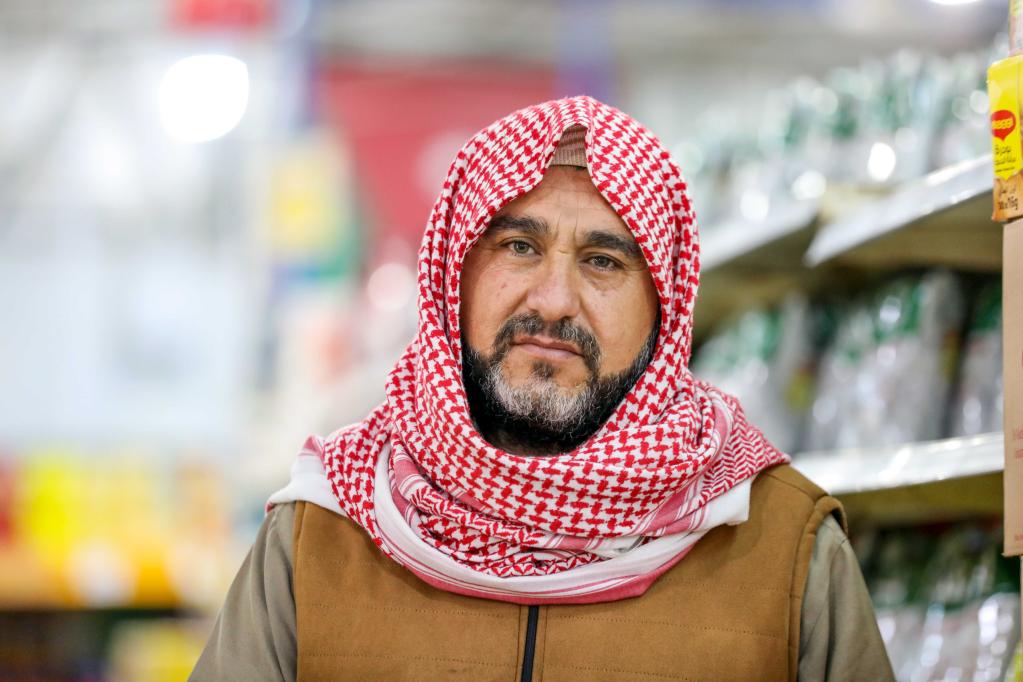
Story
06 May 2025
Leaving No One Behind: EMIS as a Path to Inclusive Education in Jordan
In today’s digital world, data is crucial for decision-making and policy development. The integration of refugee data into Jordan’s Education Management Information System (EMIS) is helping improve equal access to quality education for all students. This initiative, supported by UNESCO and funded by the European Union through the “Technical Assistance to Support Jordan’s Ministry of Education’s EMIS Platform for Enhanced Evidence-Based Decision Making” project, ensures that refugees are accessing and learning in the national education system. Jordan currently hosts over 620,000 refugees registered with UNHCR[1]. Previously, registering refugee children in Jordanian schools required multiple documents, including a UNHCR Asylum Seeker Certificate, a UNHCR refugee certificate, a passport, a birth certificate, and either a Ministry of Interior (MoI) card for Syrians or another form of identification, such as an ID card or the number provided by border authorities on the passport. Parents often had to visit schools and administrative offices repeatedly, delaying enrollment. Additionally, school administrators manually verified whether a non-Jordanian student was a refugee by checking their UNHCR Asylum Seeker Certificate each year, consuming valuable time and resources. Amira, a Somali refugee who arrived in Jordan in 2013, and Bar’a, an Iraqi refugee living in Jordan since 2012, both faced challenges in enrolling their children in school. Amira had to submit various documents, including Asylum Seeker Certificate, a passport, and a personal identification number—such as the number issued by border authorities on the passport— every year, making the process stressful and time-consuming, Now, with the alignment between EMIS and UNHCR database, all she needs is her UNHCR asylum seeker certificate for school enrollment. Similarly, Bara’a previously had to renew her son’s asylum seeker certificate, annually, visiting both UNHCR and the school for verification. With EMIS’s automated validation process, her son’s status is verified electronically in seconds, eliminating the risk of lost documents and saving time.The updates to Jordan’s EMIS platform simplify the verification of the protection status of the refugee automating the process. Instead of requiring parents to submit multiple documents, EMIS instantly validates the necessary information, reducing administrative burdens and allowing for faster student registration. Ensuring a valid Asylum Seeker Certificate number. Remains essential, as it serves as proof of refugee status and enables students to be exempted from school fees.This automation ensures that refugee students can be enrolled in school promptly, avoiding delays and disruptions in their education. It also frees up teachers to focus on their primary task—teaching.Beyond efficiency, EMIS enhances coordination between the Ministry of Education, UNHCR, and relevant partners, ensuring educational resources target the most vulnerable students It provides policymakers with reliable data to better understand refugee students’ needs, track their educational progress, and address learning gaps, ensuring they receive the necessary support to succeed academically. By minimizing data entry errors and improving inter-agency coordination, this initiative reinforces Jordan’s leadership and commitment to inclusive education. Few refugee-hosting countries have effectively disaggregated basic education data by protection status in their national EMIS. Jordan is leading the way, offering valuable insights for other countries seeking to replicate these efforts. Through the integration of refugee data into EMIS, Jordan is making important strides toward achieving Sustainable Development Goal (SDG) 4: ensuring inclusive and equitable quality education for all. This collaboration and commitment to innovation demonstrate how data-driven solutions can create a future where every child has the opportunity to learn and thrive—without delay. -END- “The Technical assistance to support Jordan’s Ministry of Education’s EMIS platform for enhanced evidence-based decision making” was jointly designed with the MoE, UNESCO and the European Union in 2022 to support the MoE’s strengthening of its enabiling environment for OpenEMIS, through the operationalization of its EMIS Policy, while also supporting the MoE to migrate their EMIS towards a sustainable and robust hosting solution. In addition, enhancements to Jordan’s EMIS were done to improve data quality, accuracy and utilization, including enhanced data on refugees.
1 of 5
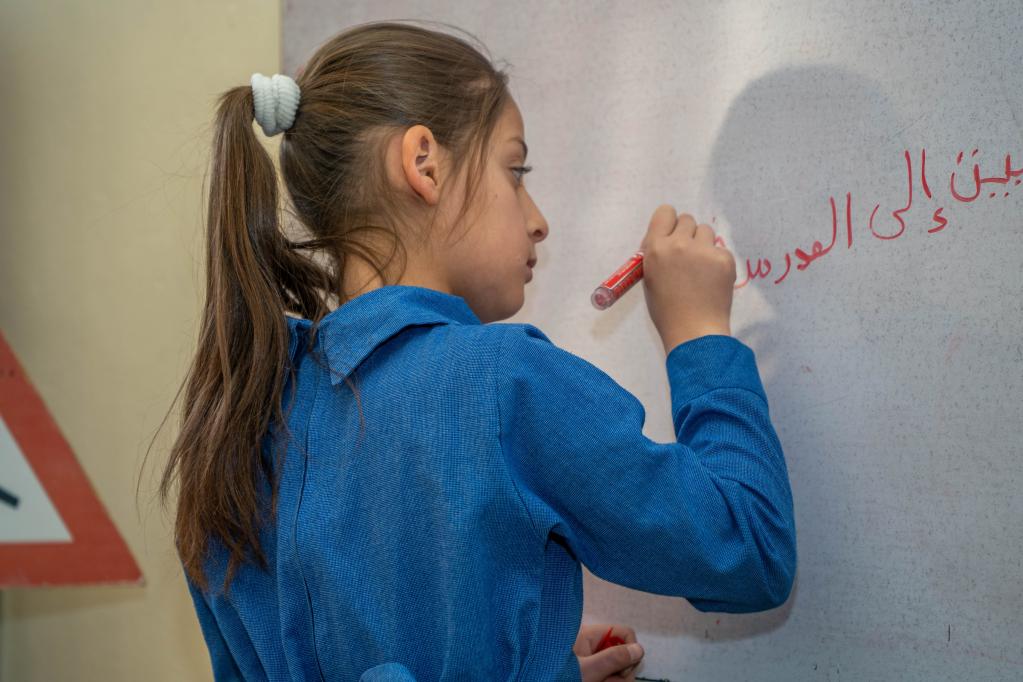
Story
03 February 2025
The Lifeline of Water: Asmahan's story in Za’atari Camp
In Za’atari camp, Asmahan, an Arabic teacher at a Makani centre, lives with her husband and six children. Their journey to Jordan began in 2013 after fleeing the war in Syria.The early days in the camp were tough. Asmahan recalls the daily struggle for clean water. "We had to carry water home in buckets and queue every day at public taps," she says. The lack of privacy at public washrooms made life even harder.Things began to change with UNICEF's intervention. The installation of water and wastewater networks transformed their living conditions. "These networks have allowed us to have water in our own houses, toilets, and kitchens, giving us a sense of normality," Asmahan explains. Living in Za’atari has taught Asmahan and her family the true value of clean water. "Unlike Syria, water here is very limited, and if we are not careful, we will run out of water before the next round of water distribution," she says. Most of their water is used for hygiene, a crucial aspect of camp life.Asmahan has instilled the importance of water conservation and hygiene in her children. "Thankfully, all of them have learned well, and we never run out of water as a result," she proudly shares.Her daughter Shahd, though shy, demonstrates how her teachers and mother taught her to wash her hands properly, a small but significant step in maintaining health in the camp.Asmahan's story is a powerful testament to the resilience and determination of families in Za’atari. It highlights how access to clean water, made possible through UNICEF’s support, is critical in improving their lives.Za’atari camp, home to over 78,500 residents, benefits from UNICEF's water, sanitation, and hygiene services. Established in 2019, these household-level systems ensure stable access to clean water, safe sanitation, and reduced operational costs, enhancing residents' quality of life.By AbdelMajid Al-Noaimi, UNICEF JordanFor more information about UNICEF's work in Jordan, please visit their official website:UNICEF Jordan
1 of 5
Story
12 December 2024
Building a stable future – Eyad Al Merjawi’s journey to decent work and social protection in Jordan
ZARQA (ILO News) — Eyad Al Merjawi, a 41-year-old refugee from Syria, has called Jordan home since 2013. Settling in the city of Zarqa, 30 km northeast of Amman, Eyad struggled to find work without the necessary permits—an obstacle to many refugees. Eyad’s journey took a positive turn, with support from Jordan’s Social Security Corporation (SSC), jointly with the International Labour Organization (ILO) and UNHCR, the UN Refugee Agency, under the PROSPECTS partnership funded by the Government of the Netherlands.The Start of the Journey Eyad's journey to stable employment in Jordan began with one essential step: securing his documentation through UNHCR’s registration system, a key tool in providing refugees with access to rights and services. In Jordan, without proper registration through UNHCR, refugees cannot access basic services such as public healthcare, education, or even employment opportunities
For Eyad, obtaining his work permit was a turning point. "It was not easy at first; I faced many obstacles just to get the permits needed for employment," he recalls. Eyad first obtained an asylum seeker certificate, which enabled him to secure his work permit and to legally work as a butcher in a shop in Zarqa. Support that makes a difference While having a job is important for ensuring financial stability for refugees, obtaining social security coverage is equally crucial to protect them from potential lifecycle risks. To help refugees better understand the social security system, SSC and UNHCR conducted a series of awareness raising activities in refugee camps and host communities. Eyad learned about the Estidama++ programme which supports vulnerable workers in enrolling in social security schemes, providing them with essential protection in navigating the uncertainties of life. Estidama++ is a social protection initiative in Jordan aimed at helping vulnerable workers, including refugees, access social security. Supported by Jordan's Social Security Corporation (SSC) and with technical support from the ILO, the programme provides subsidies to cover social security contributions, making benefits such as injury insurance, maternity leave, and pensions more accessible to informal workers in sectors like agriculture and small businesses. This support helps lower barriers to participation, creating a more inclusive and resilient workforce across Jordan. Through UNHCR's outreach, Eyad learned how Estidama++ could provide vital protections, such as coverage for work-related injuries. This knowledge empowered him to enrol in the programme, reinforcing the critical role that accessible information plays in helping refugees secure a safer and more stable future. Eyad remains hopeful for the future and is optimistic about the programme’s potential extension. “I hope it continues, not just for me but for others who need it,” he says. For Eyad, Estidama++ is more than a programme—it’s a path to self-reliance, giving refugees like him a chance to rebuild their lives with dignity and hope by securing formal and stable employment. A positive impact on refugees After enrolling in the Estidama++ programme in December 2023, Eyad has received a 100 JOD (approximately 140 USD) income support every three months. In addition, his employer, the shop owner, receives 30 JOD per month to help cover a significant portion of the shop’s social security contribution on Eyad’s behalf. This financial support has provided Eyad’s family of five with a much-needed safety while made the shop owner more inclined to retain Eyad as an employee, knowing that part of the social security cost is covered. Hope for the Future "Every day when I go to my job, I feel safe," Eyad shared. "Knowing that, even if something were to happen to me that would stop me from working, I know my family is protected through the programme." This added layer of security is not just a financial boost for Eyad and his family but also a key factor in strengthening his employment stability, showcasing how Estidama++ is improving lives and supporting vulnerable workers. Creating opportunities amid challenges Eyad is among eight thousand workers who have enrolled in social security in Jordan, thanks to the Estidama++ programme. This crucial support encourages small businesses to hire refugees like Eyad. His story is a testament to the resilience and the power of inclusive initiatives that foster economic and social stability for refugees in Jordan. *Contributed by ILO Jordan
For Eyad, obtaining his work permit was a turning point. "It was not easy at first; I faced many obstacles just to get the permits needed for employment," he recalls. Eyad first obtained an asylum seeker certificate, which enabled him to secure his work permit and to legally work as a butcher in a shop in Zarqa. Support that makes a difference While having a job is important for ensuring financial stability for refugees, obtaining social security coverage is equally crucial to protect them from potential lifecycle risks. To help refugees better understand the social security system, SSC and UNHCR conducted a series of awareness raising activities in refugee camps and host communities. Eyad learned about the Estidama++ programme which supports vulnerable workers in enrolling in social security schemes, providing them with essential protection in navigating the uncertainties of life. Estidama++ is a social protection initiative in Jordan aimed at helping vulnerable workers, including refugees, access social security. Supported by Jordan's Social Security Corporation (SSC) and with technical support from the ILO, the programme provides subsidies to cover social security contributions, making benefits such as injury insurance, maternity leave, and pensions more accessible to informal workers in sectors like agriculture and small businesses. This support helps lower barriers to participation, creating a more inclusive and resilient workforce across Jordan. Through UNHCR's outreach, Eyad learned how Estidama++ could provide vital protections, such as coverage for work-related injuries. This knowledge empowered him to enrol in the programme, reinforcing the critical role that accessible information plays in helping refugees secure a safer and more stable future. Eyad remains hopeful for the future and is optimistic about the programme’s potential extension. “I hope it continues, not just for me but for others who need it,” he says. For Eyad, Estidama++ is more than a programme—it’s a path to self-reliance, giving refugees like him a chance to rebuild their lives with dignity and hope by securing formal and stable employment. A positive impact on refugees After enrolling in the Estidama++ programme in December 2023, Eyad has received a 100 JOD (approximately 140 USD) income support every three months. In addition, his employer, the shop owner, receives 30 JOD per month to help cover a significant portion of the shop’s social security contribution on Eyad’s behalf. This financial support has provided Eyad’s family of five with a much-needed safety while made the shop owner more inclined to retain Eyad as an employee, knowing that part of the social security cost is covered. Hope for the Future "Every day when I go to my job, I feel safe," Eyad shared. "Knowing that, even if something were to happen to me that would stop me from working, I know my family is protected through the programme." This added layer of security is not just a financial boost for Eyad and his family but also a key factor in strengthening his employment stability, showcasing how Estidama++ is improving lives and supporting vulnerable workers. Creating opportunities amid challenges Eyad is among eight thousand workers who have enrolled in social security in Jordan, thanks to the Estidama++ programme. This crucial support encourages small businesses to hire refugees like Eyad. His story is a testament to the resilience and the power of inclusive initiatives that foster economic and social stability for refugees in Jordan. *Contributed by ILO Jordan
1 of 5
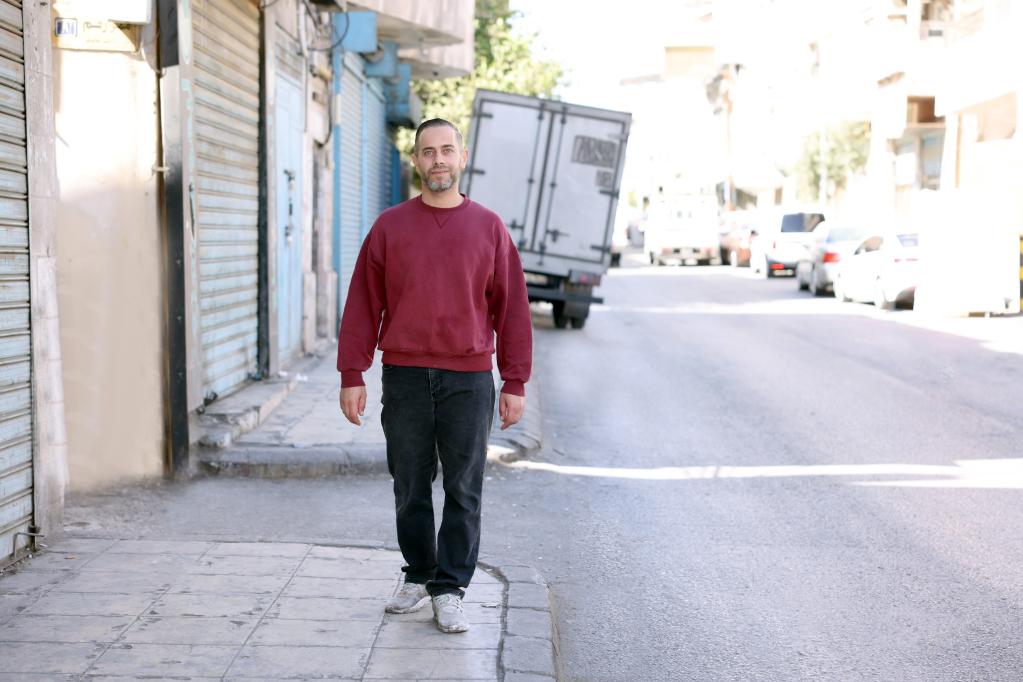
Story
09 December 2024
Empowering through nutrition: chef Manal Alalem connects with women of Zaatari camp
Walking through the dusty paths of the Zaatari refugee camp, the sounds of children playing and the smell of freshly baked bread filled the air—a testament to life persisting despite hardship. For Chef Manal Alalem, this wasn’t her first visit to Zaatari. Still, each journey to this sprawling camp carried a new depth of emotion and purpose. As a WFP Goodwill Ambassador in Jordan, she has witnessed firsthand the resilience of Syrian refugees navigating the challenges of displacement. This time, her visit focused on connecting with several women who benefit from WFP’s monthly food assistance and have participated in nutrition awareness sessions for pregnant and breastfeeding mothers.Manal’s morning began in one of the camp’s community kitchens, where a group of women sat in a circle, recipe books and educational fact cards in hand. The session, led by a WFP nutritionist, emphasized practical tips for improving family diets using simple and affordable ingredients. Holding up one of the books, Manal explained how making informed food choices could transform lives. “Food is more than just survival—it’s a way to nurture, heal, and empower,” she shared with the women, her voice carrying the warmth of someone who deeply cares. Manal then invited the group to join her in preparing a communal meal using recipes from the book. As they cooked, the conversation flowed naturally, creating a space for the women to share parts of their experiences. Among them was Fatima, a mother of seven, whose story embodied the hardships and triumphs faced by many in the camp.Fatima, now in her forties, arrived at Zaatari in 2014 with her husband and children after fleeing the Damascus suburbs. Two of her daughters were born in the camp, and two others are now married with children. Her family’s life back home revolved around agriculture, but in Zaatari, Fatima found herself navigating an entirely new reality. “When I first came here, I relied on the knowledge passed down from my mother and relatives about feeding babies and caring for myself during pregnancy,” Fatima shared with Manal as she stirred a pot of lentils, rice and spinach.Later, after the meal, Fatima sat with Manal to share more of her journey. “Much of that advice turned out to be wrong—or even harmful,” she said, explaining how WFP’s nutrition awareness sessions had opened her eyes. “I used to think giving honey to my babies would make them strong,” she admitted. “But I learned that it can be dangerous before they turn one. Now, I feel confident and safe in my choices.”Manal was visibly moved by Fatima’s story, adding: “You’ve not only transformed your own family’s health but become a teacher for others,” she said, smiling. Fatima nodded, explaining how she now shares this knowledge with her daughters, neighbours, and friends, spreading positive change throughout the camp community. Nearby, Hamida, a single mother of three, was busy arranging ingredients for a vegetable stew. During the cooking session, Hamida shared how she had struggled with anaemia for years, a condition exacerbated by the limited food options available to her family. However, she said the nutrition awareness program had taught her how to balance meals. “I never thought food could change so much,” Hamida told Manal. “I started replacing expensive ingredients with affordable ones that are just as nutritious. For example, I learned to use lentils instead of meat in some dishes. My anaemia improved, and I can see the difference in my blood test results.”Later, in a quieter moment after the session, Hamida spoke more about the challenges her family faces. “The monthly food assistance has been reduced for over a year, and it’s hit us hard,” she said. “But I’ve learned to adapt and make the most of what we have. I feel confident now when purchasing food for my kids, knowing what to introduce on the table.”Hamida’s message to other women was clear and adamant: “Improve your knowledge. Look for correct information and leave behind misconceptions and harmful cultural practices, especially those related to food intake. It has a direct effect on your family’s health.”Listening to these stories, Manal was reminded of the immense challenges refugees face, especially in camp environments where resources are scarce. Yet, the resilience and ingenuity of women like Fatima and Hamida stood as a beacon of hope. “Your strength inspires me,” she told them as they gathered to serve the meal they had prepared together.The session ended with laughter and shared plates, but the realities of camp life lingered in Manal’s mind as she walked back through Zaatari’s winding paths. She reflected on the urgent need for increased support to meet the needs of vulnerable families.At the heart of these efforts is WFP’s partnership with the King Salman Humanitarian Aid and Relief Centre (KSrelief), whose contributions, alongside other generous donors, help sustain WFP’s monthly food assistance for thousands of refugees. To improve the nutritional status of families receiving monthly assistance, WFP is integrating a nutrition awareness component focusing on families with specific needs, such as pregnant and breastfeeding women and children aged 6–23 months. Through training and educational tools, WFP is raising awareness about the importance of diverse, nutritious diets to address these needs. However, with refugee needs outpacing available resources, Manal emphasized the importance of continued collective action to address the gaps. “Every meal shared, every piece of knowledge passed on—it all makes a difference,” she said. “But we must ensure these families have the support they need not only to survive, but to thrive.”As she departed Zaatari, Chef Manal carried with her stories of struggle, hope, determination, and the power of community—proof that, even in the most challenging circumstances, the human spirit remains unbreakable.
1 of 5
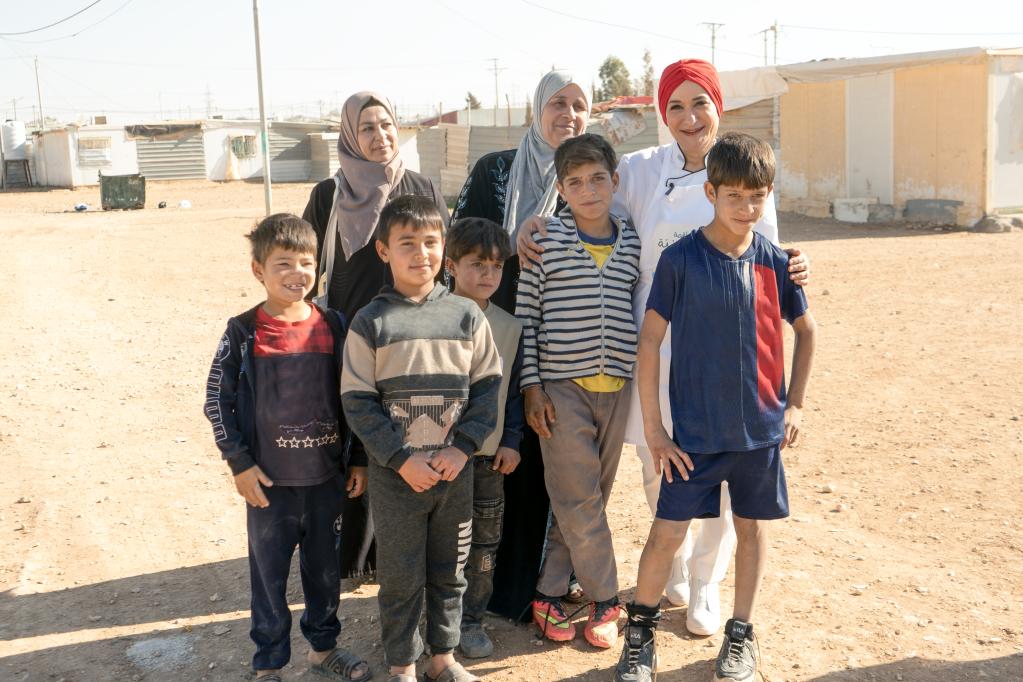
Press Release
03 July 2025
“Through Their Lens” Exhibition opens: Syrian refugees share their stories in photos
“Through Their Lens”, a photography exhibition, opened yesterday in Amman, offering an authentic glimpse into the lives of Syrian refugees living in Jordan. The exhibition is the result of a joint initiative under the PROSPECTS partnership — a Netherlands Strategic Partnership with the IFC, ILO, UNHCR, UNICEF, and the World Bank — aimed at improving the prospects of refugees and host communities in Jordan.Through a series of photography trainings, Syrian refugees were equipped with basic photography and digital storytelling skills. Using only smartphones, participants captured personal stories highlighting their work, family life, education, and daily routines, with submissions from both adults and children.More than 32 photographs, selected by a jury of humanitarian experts and photographers, are on display at Manara Arts & Culture Center in Al Luweibdeh, to reflect the broad range of experiences shared by participants. “Under the PROSPECTS partnership, we aim not only to provide support in education, employment, protection, and WASH but also to show the value that refugees bring to the communities they live in. This exhibition is a powerful example of how photography and storytelling can give voice to refugee perspectives,” said H.E. Mr. Harry Verweij, Ambassador of the Kingdom of the Netherlands to Jordan.“This exhibition shows us the reality of life in displacement not through reports or statistics, but through the eyes of those living it. By giving refugees the opportunity to capture and share their own stories, we are reminded that every refugee is also a person with dreams and a voice to be heard. This exhibition is also an opportunity to honor Jordan as a generous host that has provided safety and dignity to those who had to flee their own countries. UNHCR thanks the Kingdom of the Netherlands and its Ambassador to Jordan for continued solidarity with refugees and host communities, and for helping them to realize their dreams through supporting access to social protection, employment, and education.” Maria Stavropoulou, UNHCR Representative to Jordan.“Behind every photo in this exhibition is a story of courage, hope, and determination to build a better future. We are proud to be part of the PROSPECTS partnership, which not only invests in services and livelihoods but also in the power of people to tell their own stories.” said Holly Benner, World Bank Resident Representative to Jordan.“IFC is committed to advancing economic inclusion through private sector driven solutions by equipping women, youth, and displaced communities with the tools to succeed. Through targeted entrepreneurship and digital skills training, we help transform potential into investment-ready businesses and meaningful job opportunities. To ensure these efforts are impactful and locally relevant, we work closely with our Prospects partners, aligning economic opportunities with community needs through data-driven market assessments,” said, Marcel Rached, IFC’s Country Head for Jordan. “At UNICEF, we believe that every child should have the opportunity to learn, grow, and be heard. Through Their Lens shows what becomes possible when young people are equipped with the right tools and support. Under the PROSPECTS partnership, and thanks to the generous support of the Government of the Netherlands, UNICEF has reached thousands of children and youth with integrated services that combine education, protection, and skills development. This exhibition is a testament to the impact of partnership — not just in delivering services, but in amplifying voices and building futures,” said Shairose Mawji, Acting Representative, UNICEF Jordan."As the recent monumental changes in Syria hold a glimmer of hope for refugees to return and rebuild their life in their country, this exhibition is a meaningful reflection of the result of giving people both the tools and the opportunity to tell their story." Said Shaza Al Jondi, ILO Prospects- Regional Chief Technical Adviser for Arab States."As part of our commitment to skills building and decent work, the ILO along with its PROSPECTS partners, supported Syrian refugees from across Jordan with training on how to capture photographs using just their phones. As we can see from the event, the outcome has been a very impressive portrayal of life through their eyes. We are very proud of this initiative, which turns skill-building into storytelling and ensures that refugee voices are not only heard, but also seen." The exhibition will be open to the public from Wednesday 2 July through to Sunday 5 July 2025. It is expected to attract visitors to reflect on Syrian refugees’ daily lives and aspirations for their future.PROSPECTS is a global partnership that aims to improve the access of host communities and refuges to quality education, social protection, water and decent work. It Is funded by the Kingdom of the Netherlands and implemented by IFC, ILO, UNHCR, UNICEF and the World Bank.
1 of 5
Press Release
03 June 2025
WFP in Jordan to provide school meals to 30,000 students in camps as of September
JORDAN—The United Nations World Food Programme (WFP) has welcomed a contribution from the Government of the People’s Republic of China to support the National School Feeding Programme in Jordan by providing healthy school meals for 30,000 students in the Zaatari and Azraq refugee camps.The contribution will enable WFP to distribute nearly 2.7 million healthy meals over two semesters during the coming scholastic year beginning in September 2025. As much as supporting schoolchildren’s daily nutritional needs, the project will create employment opportunities for 90 refugee women who will prepare the meals in three dedicated kitchens within the camps. The programme also supports local farmers, bakers, and food producers in Jordan. "We are deeply grateful for this timely and impactful contribution from China," said WFP Representative and Country Director in Jordan Alberto Correia Mendes. "This generous funding enables us to feed vulnerable refugee children, providing healthy school meals that support their well-being and development, while also contributing to addressing food insecurity at the camp level," he added.The homegrown meals, which consist of a freshly baked pastry, a fruit, and a vegetable help meet children’s immediate food needs while enhancing dietary diversity and encouraging healthier eating habits. The Ambassador of People’s Republic of China to Jordan, H.E. Chen Chuandong, praised Jordan for its pivotal role in hosting Syrian refugees and maintaining regional peace and stability. He also acknowledged the World Food Programme’s efforts in supporting Syrian refugees in Jordan. Ambassador Chen highlighted China’s active participation in international humanitarian efforts, driven by the goal of fostering global cooperation and sustainable development.“This assistance demonstrates China’s tangible commitment to advancing the United Nations 2030 Agenda for Sustainable Development, while serving as a strong example of South-South cooperation,” said Ambassador Chen. He reaffirmed China’s readiness to collaborate with the international community to enhance refugees living conditions and promote food security, urging all parties to continue supporting Syrian refugees.Under the National School Feeding Strategy, WFP and the Government of Jordan are working to scale up the homegrown healthy meals model to reach 500,000 vulnerable students by 2030.
1 of 5
Press Release
02 June 2025
FAO and the Norwegian Embassy visit project boosting food security and livelihoods in Jordan
AMMAN, Jordan – The Food and Agriculture Organization of the United Nations (FAO) and the Norwegian Embassy, in close collaboration with the Ministry of Agriculture (MoA), visited Madaba Governorate to witness the progress of the project, "Transformation to more efficient, inclusive, resilient, and sustainable agrifood systems." This vital initiative, generously funded by the Royal Norwegian Government, aims to bolster food security and create decent work opportunities across Jordan. The visit saw the participation of Eng. Khaled Alheisa, Assistant Secretary-General of the Ministry of Agriculture on behalf of the Minister of Agriculture, alongside Ms. Birgitte Sørgaard Wessel, Head of Development Cooperation at the Norwegian Embassy, and Eng. Nabil Assaf, FAO Representative in Jordan. A diverse group of project team and stakeholders and beneficiaries also attended, offering direct insights into the project's progress. The primary objective of the visit was to review the on-the-ground progress of the project's second phase, engage with beneficiaries, identify key challenges, discuss solutions and recommendations, and explore ways to maximize the project's positive influence on participants' lives.During the visit, Ms. Birgitte Sørgaard Wessel, Head of Development Cooperation at the Norwegian Embassy, said “This project highlights the value of partnerships that bring together government, international organizations, and local communities. It was encouraging to see how the project has supported both Jordanians and Syrians, women and men, and how it is contributing to more inclusive and practical support for small-scale farmers. We appreciate the openness of the farmers and local teams who shared their experience with us today, and we look forward to building on the lessons learned.”The project strategically targets vulnerable farmers from both Jordanian host communities and Syrian refugee populations, where 111 farmers have already benefited from the Beneficiary Grants Program and the Technical Capacity Building Program for Farmers in Agribusiness Management. These interventions are designed to increase financial returns for participants and enhance the overall efficiency of their agricultural ventures.Assistant Secretary-General of the Ministry of Agriculture, Engineer Khaled Alheisa, emphasized that all these activities are aligned with mitigating the impact of climate change and adapting to water scarcity. They also contribute to increasing household income, enhancing food security, creating job opportunities, and alleviating unemployment. "This project, meticulously designed to foster more efficient, inclusive, resilient, and sustainable agrifood systems in Jordan, directly tackles our region's challenges," said Eng. Nabil Assaf, FAO Representative in Jordan. "Given limited natural resources, population growth, and climate change, our aim is to manage these vital resources optimally, ensuring their sustainability and building greater resilience. This visit is essential for us to witness the project's progress firsthand, engage with our beneficiaries and partners, and explore every avenue to amplify its positive reach," he added.This initiative plays a pivotal role in strengthening sustainable food security for Syrian refugees and Jordanian host communities. It integrates them into effective agri-food systems and builds capacities for decent job creation through integrated training. The project also champions the reduction of food loss and waste, a critical measure for advancing sustainability and rural development.To meet beneficiary needs, the project has delivered comprehensive training, distributed essential tools, facilitated access to microfinance and markets, and created direct job opportunities.Overall, the project has reached 850 beneficiaries: 50% women, 70% Jordanians, and 30% Syrian refugees residing in host communities.
1 of 5
Press Release
28 May 2025
UN Observes International Day of United Nations Peacekeepers on 29 May
New York – The United Nations Headquarters will observe the International Day of United Nations Peacekeepers on Thursday, 29 May 2025. In 1948, the historic decision was made to deploy military observers to the Middle East to supervise the implementation of Israel-Arab Armistice Agreements, in what became the United Nations Truce Supervision Organization. Since that time, more than two million peacekeepers have served in 71 operations around the world. Today, some 68,000 women and men serve as military, police and civilian personnel in 11 conflict zones across Africa, Asia, Europe, and the Middle East. 119 countries currently contribute uniformed personnel.Jordan currently contributes 232 military and police personnel to six UN peacekeeping operations. The largest number, 149, serve in the Democratic Republic of the Congo while the others are deployed to Abyei, the Central African Republic, Cyprus, South Sudan and the Western Sahara. During ceremonies at United Nations Headquarters, Secretary-General, António Guterres, will lay a wreath to honour the more than 4,400 UN peacekeepers who have lost their lives since 1948, including 68 who came from Jordan.He will also preside over a ceremony in the Trusteeship Council Chamber, at which Dag Hammarskjöld Medals will be awarded posthumously to 57 military, police, and civilian peacekeepers, who lost their lives serving under the UN flag last year.The Secretary-General will also present awards to the 2024 Military Gender Advocate of the Year, Squadron Leader Sharon Mwinsote Syme from Ghana and the UN Woman Police Officer of the Year award to Superintendent Zainab Gbla of Sierra Leone. Both of them serve with the United Nations Interim Security Force in Abyei (UNISFA). This year’s theme for the Day is “the Future of Peacekeeping”. The theme emphasizes that the ‘Pact for the Future’ – adopted last year at the United Nations – includes a commitment to adapt peacekeeping to our changing world, as expressed Member States’ pledges presented to fill capability gaps and help adapt UN peacekeeping to emerging challenges and new realities at the recent Peacekeeping Ministerial in Berlin.
In his message, United Nations Secretary-General António Guterres said: “Today, peacekeepers face increasingly complex situations in an increasingly complex world... Now more than ever, the world needs the United Nations -- and the United Nations needs peacekeeping that is fully equipped for today’s realities and tomorrow’s challenges.” “Today, we honour their service,” Mr. Guterres stated. ‘We draw inspiration from their resilience, dedication and courage. And we remember all the brave women and men who made the ultimate sacrifice for peace. We will never forget them – and we will carry their work forward.” “Our personnel are our most important capability. The sacrifices made by our peacekeepers call for more than remembrance; they demand action,” said Jean-Pierre Lacroix, Under-Secretary-General for Peace Operations. “Throughout its history, peacekeeping has always adapted to ever-changing contexts to achieve results. The future of peacekeeping hinges on our collective commitment to continue to adapt and invest—so we can continue delivering hope and protection where it’s needed most,” he added.The International Day of UN Peacekeepers was established by the UN General Assembly in 2002, to pay tribute to all men and women serving in peacekeeping, and to honour the memory of those who have lost their lives in the cause of peace. # # #
In his message, United Nations Secretary-General António Guterres said: “Today, peacekeepers face increasingly complex situations in an increasingly complex world... Now more than ever, the world needs the United Nations -- and the United Nations needs peacekeeping that is fully equipped for today’s realities and tomorrow’s challenges.” “Today, we honour their service,” Mr. Guterres stated. ‘We draw inspiration from their resilience, dedication and courage. And we remember all the brave women and men who made the ultimate sacrifice for peace. We will never forget them – and we will carry their work forward.” “Our personnel are our most important capability. The sacrifices made by our peacekeepers call for more than remembrance; they demand action,” said Jean-Pierre Lacroix, Under-Secretary-General for Peace Operations. “Throughout its history, peacekeeping has always adapted to ever-changing contexts to achieve results. The future of peacekeeping hinges on our collective commitment to continue to adapt and invest—so we can continue delivering hope and protection where it’s needed most,” he added.The International Day of UN Peacekeepers was established by the UN General Assembly in 2002, to pay tribute to all men and women serving in peacekeeping, and to honour the memory of those who have lost their lives in the cause of peace. # # #
1 of 5
Press Release
08 May 2025
FAO and Ministry of Agriculture partner to advance agricultural sustainability and food security
In a significant step toward advancing Jordan’s agricultural sector and enhancing food security, the Food and Agriculture Organization of the United Nations (FAO) in Jordan, the Ministry of Agriculture (MoA) and the National Agricultural Research Center (NARC), officially signed two groundbreaking projects in a ceremony attended by the Minister of Agriculture and the Director General of NARC.This signing marks a crucial commitment to bolstering sustainable agricultural development and improving livelihoods across Jordan. The two projects represent a targeted investment aligned with national priorities for food security and economic resilience. The first project, “Conservation and Genetic Enhancement of Local Almond Varieties in Jordan for Sustainable Agricultural Development,” focuses on preserving Jordan’s rich agricultural heritage. In collaboration with NARC and research institutions, FAO will undertake the documentation, analysis, and conservation of Jordan’s indigenous almond varieties—particularly those threatened by climate change, agricultural modernization, and limited genetic data. Through genetic and morphological studies, conservation strategies, and the development of new cultivars, this initiative will enhance biodiversity and strengthen resilience within the agricultural sector.The second project, “Strengthening Jordan’s Agriculture Sector Through Enhanced Capacities and Market Access,” aims to improve food security and rural livelihoods by supporting farmers with sustainable farming practices, boosting productivity, and expanding market access. This project will provide farmers with essential tools and training, foster public-private dialogue, and create enhanced market entry opportunities, including Agri-fairs. It directly responds to key national challenges such as water scarcity, unemployment, and global economic pressures, reinforcing the Jordanian government and Royal vision for enhanced food security.As part of the event, the Minister of Agriculture and FAO Representative also signed an additional agreement to enhance farmers’ skills and capacities through climate smart agricultural practices to cope with climate change impact in the targeted governorates of Madaba, Karak, Tafileh and Ma'an. Under this agreement, 16 farmer field schools will be established, while necessary equipment will be identified for an additional schools to be established later, aiming to improve the farmers’ adaptation to climate change. This agreement falls under the "Building Resilience to Cope with Climate Change in Jordan through Improving Water Use Efficiency in the Agriculture Sector (BRCCJ)" project, funded by the Green Climate Fund (GCF) and implemented by FAO in collaboration with key partners—the Ministry of Agriculture, Ministry of Water and Irrigation, Ministry of Environment, and the United Nations Development Programme (UNDP).During the signing ceremony, H.E Eng. Khaled Hnaifat, the Minister of Agriculture emphasized the importance of these initiatives in strengthening Jordan’s agricultural sector, noting that the projects will help farmers, researchers, and institutions adopt innovative and sustainable approaches to food production and distribution.The Director General of NARC, Dr. Ibrahim Al-Rawashdeh, valued FAO's trust in NARC, through the active partnership in the project for the conservation of local almond varieties. This project is considered one of the first research projects that the National Seed Bank will implement after its inauguration, which was honored by the high royal patronage and is considered one of the projects of the Economic Modernization Vision and the National Sustainable Development Plan implemented by the Jordanian Ministry of Agriculture."FAO Representative in Jordan, Eng. Nabil Assaf, highlighted the organization’s dedication to empowering Jordanian farmers with the tools and knowledge to adapt to climate challenges. He stated, “These agreements reflect FAO’s strong commitment to supporting Jordan’s agricultural sector with sustainable solutions that enhance resilience and productivity. By working together, we can help farmers adopt climate-smart practices, conserve essential resources, and secure a stable food future for Jordan.”FAO and the Ministry of Agriculture expressed their dedication to fostering strong partnerships and collaboration, ensuring that these projects pave the way for a more resilient and prosperous agricultural future in Jordan
1 of 5
Latest Resources
1 / 11
1 / 11

